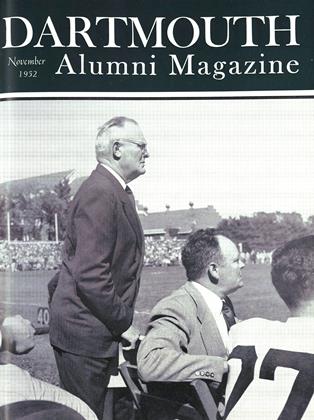When the varied functions of the Personnel Bureau were reorganized with the retirement of Prof. Francis J. Neef on June 30, the College established a new Office of Financial Aid and a new Office of Placement and Staff Personnel, and announced that special study would be given to the College's program of undergraduate counseling before any announcement was made concerning the reorganization of that part of the Personnel Bureau's responsibilities.
On September 1 a new Office of Student Counseling joined the offices created to handle financial aid and placement. It represents an expansion as well as a reorganization of student counseling and, under the general supervision of Dean McDonald, will centralize many of the advisory services the College has been offer- ing to students with educational, vocational and emotional problems.
The faculty personnel of the office includes a newly appointed Academic Counselor, who is Herbert R. Sensenig '28, Professor of German. Continuing the duties they performed in the former Personnel Bureau are Dr. John B. McKenna, College psychiatrist; Prof. Francis W. King, clinical psychologist; and Prof. Robert M. Bear, who has been in charge of remedial reading for a number of years and who now has the title of Supervisor of Aptitude Testing and the Reading Clinic, with responsibility for interest, aptitude and vocational testing as well as reading improvement.
As Academic Counselor, Professor Sensenig will be responsible for developing a program of counseling to aid students in the choice of courses and majors, in the more effective performance of academic work, and in preparation for graduate studies. He will work closely with all departments of the College, the associated schools, the class advisers, freshman advisers, and individual members of the faculty. One of his duties will be to over- see the work of foreign students. It is expected that during the course of the year he will make a special study of the freshman advisory system and of the work of class officers and departmental advisers, with a view to strengthening academic counseling throughout the College.
Dean McDonald, who has general responsibility for the work of the Office of Student Counseling, last month made this statement concerning the new program:
"Dartmouth selects for admission boys who have the intelligence and aptitude necessary for a successful undergraduate career. Some college students, however, do not have successful careers for a variety of reasons such as inadequate advice about courses and majors, deficiencies in reading skills, immaturity of attitudes, emotional conflicts, or lack of proper motivation. The Office of Student Counseling exists to help all these men. The services of its trained, sympathetic advisers should be of the greatest help to students in solving their educational, vocational and emotional problems.
"Academic counseling has been available in the past from many sources the Deans, the class advisers, the freshman advisers, departmental chairmen, and members of the faculty. While much of it must continue to be done on a decentralized basis, its effectiveness can be greatly increased through the coordination and centralization now provided by the Office of Student Counseling."
President Dickey, in a memorandum to the faculty, has stated that it is contem- plated that ultimately the responsibility for the coordination of student counseling activities throughout the College will be centered in this office under the general supervision of a Director.
THE CHEERLEADERS ARE BACK IN BUSINESS ON MEMORIAL FIELD
 View Full Issue
View Full Issue
More From This Issue
-
 Article
ArticleOn Educational Policy
November 1952 By PROF. ANTON A. RAVEN -
 Article
ArticleThe Business of Being a Gentleman
November 1952 -
 Class Notes
Class Notes1918
November 1952 By ERNEST H. EARLEY, DONALD L. BARR -
 Class Notes
Class Notes1929
November 1952 By F. WILLIAM ANDRES, EDWIN C. CHINLUND -
 Article
Article"The Greatest Sport"
November 1952 -
 Class Notes
Class Notes1921
November 1952 By REGINALD B. MINER, ROBERT M. MACDONALD







